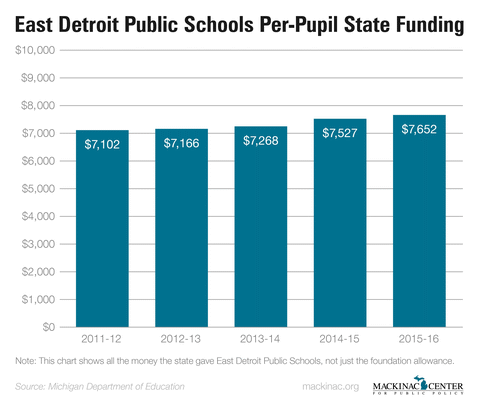More Mythical School Funding Cuts Reported
But even with no cuts, school boards face big challenges
Remarks by Eastpointe Mayor Suzanne Pixley in the Detroit Free Press imply that school revenue declines made it harder for East Detroit Schools to repay debt incurred to cover overspending in previous budgets.
The Free Press reported: “She said the district got itself of out an $8 million deficit and while test scores were down in 2008, like other districts, the city lost 46 percent of its taxable value when the economy tanked, hurting revenue to the school district.”
East Detroit’s overspending problem began in the 2008-09 school year and continued until 2013-14. The district finally paid off the debt in June 2015.
ForTheRecord: The collapse in real estate values in 2008 did eventually result in lower property tax revenues for municipalities across the state – but that is not what determines how much schools get for day-to-day operations. Michigan public schools’ main revenue stream is the product of a complex state formula that was not directly affected by local property tax declines.
In other words, East Detroit Schools’ “deficit” problem had nothing to do with property tax receipts. Audited financial reports and state databases reveal the district’s overspending debt peaked at $8.2 million in June 2010. Over the next four years, the debt was gradually reduced to $7.9 million (2011), $7.5 million (2012), $5.0 million (2013) and $1.3 million (2014). It was wiped out in 2015.
In each year from 2011-12 to 2015-16 – which includes the years East Detroit was paying down its debt – the district received more money per student for school operations.
East Detroit Schools’ problems were aggravated by a 25 percent decline in enrollment from 2012 to 2016, from 4,303 students to 3,227 students. Since state funding follows the student, when students go elsewhere so does the money they bring in.
Michigan Capitol Confidential is the news source produced by the Mackinac Center for Public Policy. Michigan Capitol Confidential reports with a free-market news perspective.



 Wayne-Westland School District facing $30M deficit
Wayne-Westland School District facing $30M deficit
 Moolenaar bill would apply leftover COVID funds to the deficit
Moolenaar bill would apply leftover COVID funds to the deficit
 Michigan ranked 34th for population growth over four years
Michigan ranked 34th for population growth over four years